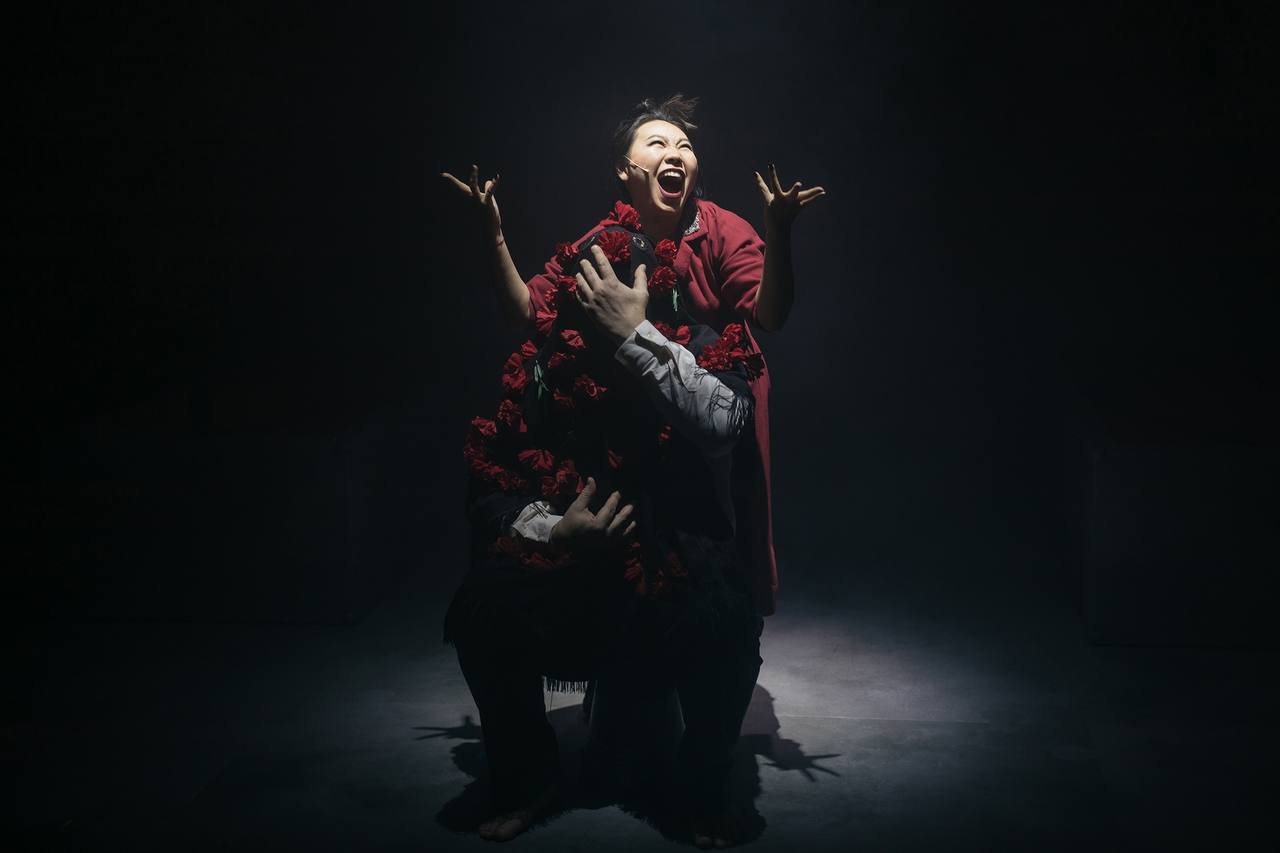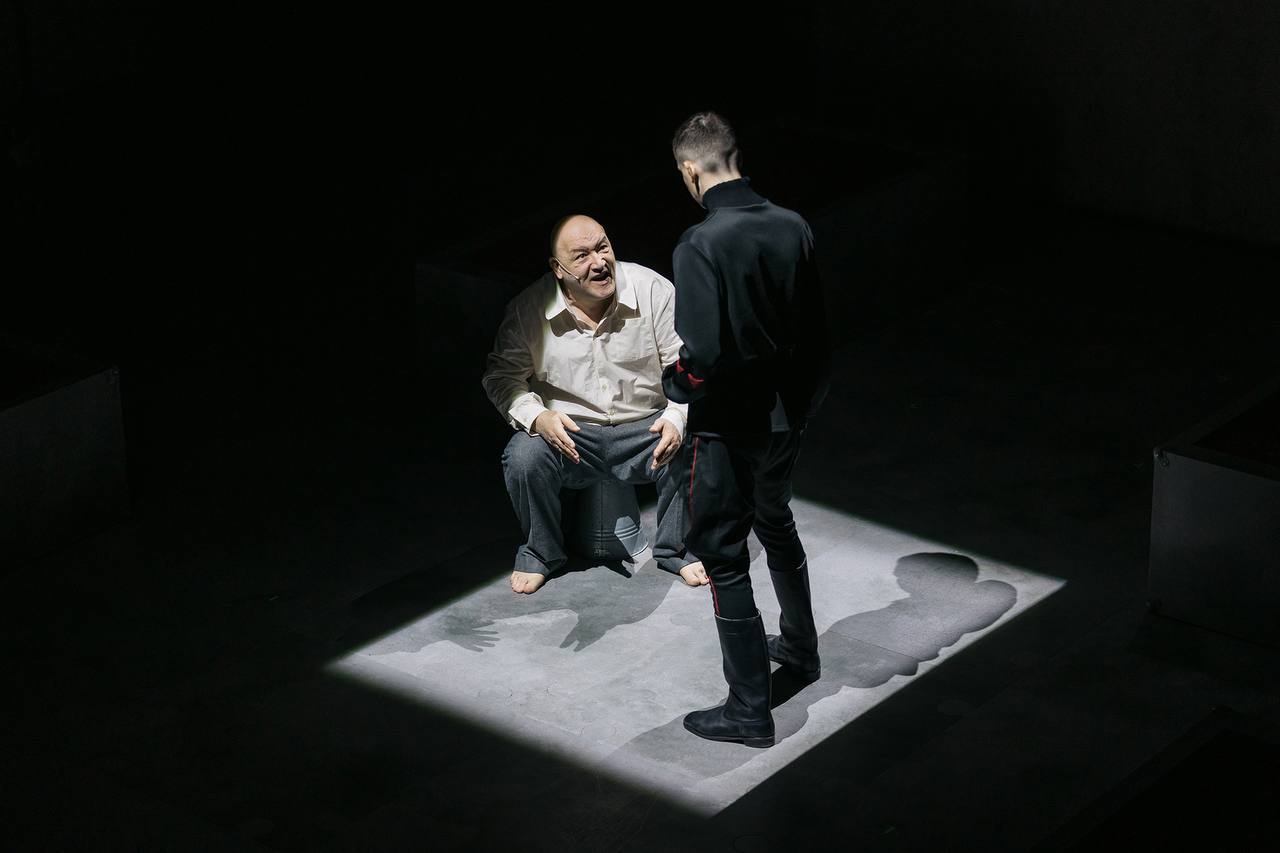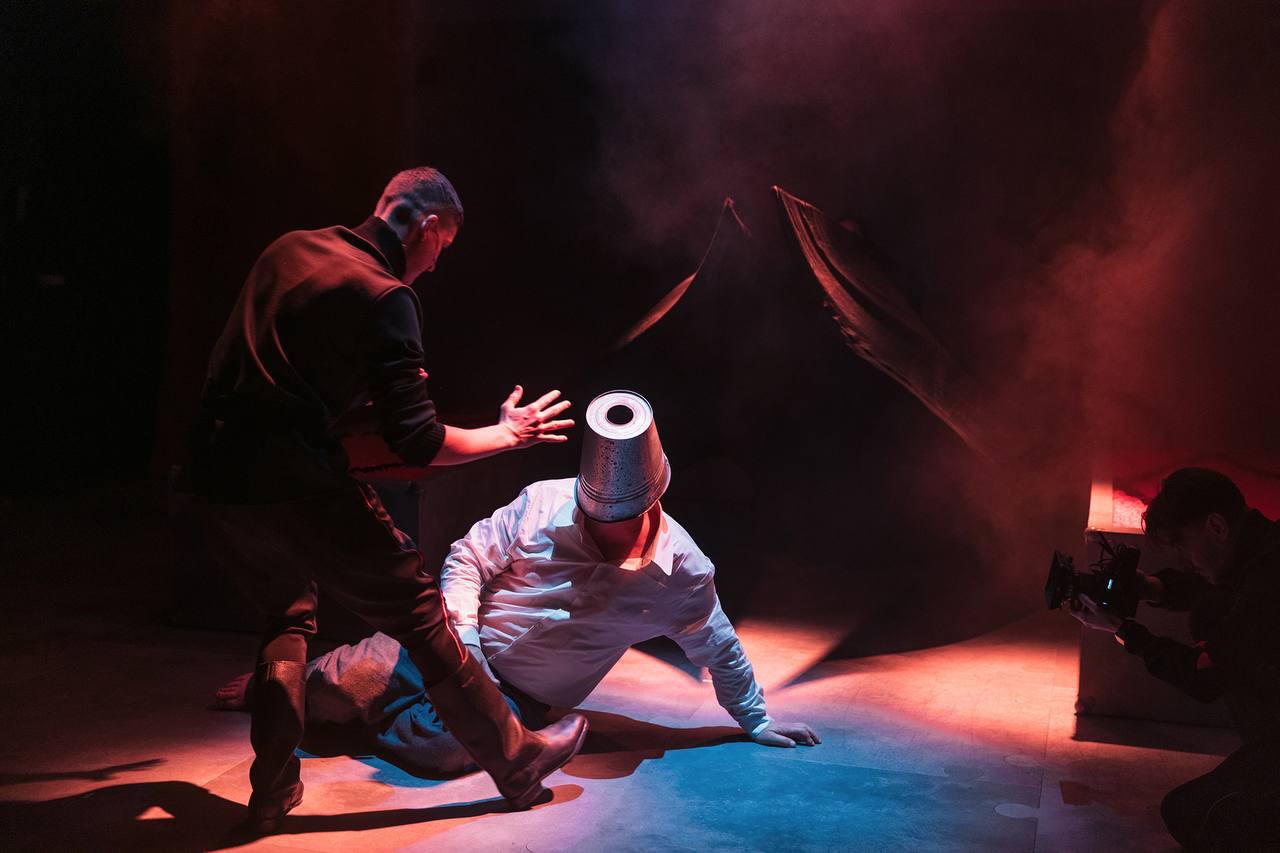Fiery Charon. Maxim Sukhanov plays the crematorium director
“The Cremulator,” a play directed by Maxim Didenko and written by Sasha Filippenko, has been brought to London. The lead role is played by Maxim Sukhanov, who portrays a real historical figure, the director of a crematorium during Stalin’s repressions. However, this is not a biopic but rather an artistic fantasy where the historical character serves as the starting point.
Eerie, inhuman, terrifying, guttural sounds fill the room, evoking horror scenes of zombies in abandoned morgues. Combined with the glamorous audience, this creates a surreal atmosphere—friendly smiles mixed with this ominous noise.
The stage is separated from the audience by a fire curtain labeled “safety curtain,” which itself becomes part of the performance: it divides the world of the living from the dead, life from fire. Eventually, it rises, though delayed by more than 20 minutes.
On stage is a signature screen—often used by director Maxim Didenko in his productions—and four actors: two NKVD investigators, the protagonist, and his beloved woman.
Watching Maxim Sukhanov’s performance, it’s hard to resist using words like “great.” But why should we resist? Sukhanov portrays Pyotr Nesterenko, a nobleman, a military officer, an emigrant, and in his later years, the director of Moscow’s first crematorium at Donskoy Cemetery.

Beside him constantly moves the small, delicate figure of Vera, the great love of Nesterenko’s life, played by Russian-speaking actress Yan Ge of Chinese descent. She moves in a jerky rhythm, acting out everyday moments of parting one moment and then suddenly singing with a voice both terrifying and beautiful, like molten glass. Her accent is like the sound of candy rattling in a tin box. Her character speaks about how she won’t become a star in Paris due to her accent—yet the actress saying this clearly knows she’s lying. Is this a Brechtian alienation effect, a double meaning, a trick?
The direction here is sharp, cold, and calculated like an architectural drawing. But again and again, it’s shaken from within by this huge man—not fat, but powerful, like a mountain. He moves slowly, looks slowly, even his silences are significant and frightening. Sukhanov as Nesterenko sits amidst a set filled with boxes, lids, red and black surfaces—this fiery Charon surrounded by coffins that transform into windows, prison cell doors, or dressing room corners in an endless array of metamorphoses.

At first, it seems he’s in his domain, the king of this dark valley, but no. The play is an interrogation. Pyotr Ilyich Nesterenko is being interrogated by two NKVD officers, sleek and lean, their black breeches fitting their thin legs too perfectly. They become increasingly savage, hissing “Show us!” (A theatrical word suddenly takes on a sinister meaning in the play—“testify against yourself”).
One investigator (Frol Podlesny) constantly wields a camera, focusing it on Nesterenko, while the other conducts the interrogation with whip-like fingers. But what’s going on here? This enormous man could crush them with a flick of his finger or a sigh, yet for some reason, he endures their abuse and beatings.
The play presents cruelty in close-up (broadcasted from the camera to the screen) so the audience can’t miss the horror of the torture. The protagonist is kicked, a bucket is put on his head, he’s hit with the bucket, and strangled against its rim. And yet he endures…
The production is filled to the brim with macabre details of funeral life, evoking scenes from Bulgakov’s novel where a young man goes to a hospital morgue to retrieve the body of a slain commander, examining the gruesome place with horrified fascination. Yet Sukhanov’s titanic effort prevents the play from becoming merely a spectacle of horror—he doesn’t emphasize the nightmare but rather downplays it, normalizes it, and the result is an even more powerful effect.

But it’s not Nesterenko’s work, his love drama, or even the savage face of the regime that takes center stage here. Sukhanov wears this play like his white shirt, in which he performs, and at times the performance feels like it can barely contain him. Eventually, it falls apart, leaving behind the ancient mystery of dying.
At times, it seems that Nesterenko is using the interrogators like psychoanalysts, reflecting on and analyzing his life as if it’s already over. And indeed, he recounts his life as if it’s finished. Yes, you understood correctly.
Suddenly, he begins to sing in a low, deep overtone voice, resembling the Tibetan Buddhist tradition of Dzoké, where darkness, the roar of pure mountain streams, and the voices of wrathful deities resound.
Meanwhile, the delicate Vera transforms into Garuda, the mythical bird, with her beautiful face and huge, terrifying wings. Garuda, by the way, is the firebird in one of the Tibetan religions.
It’s as if everything is happening not in reality but in the Tibetan Bardo, through which Nesterenko’s soul travels in the four post-death realms toward its next rebirth. All these interrogators, women, old men, recruiters, executioners, and other birds and people in military coats—they don’t exist in reality… oh, so that’s what it is!
But then, suddenly, the lights in the auditorium blaze. Instead of an intermission, actor Igor Titov (who plays the interrogator, not an emanation of a wrathful deity in the Bardo) starts talking to the audience about modernity. This unexpected moralizing interlude shatters the entire theory of the otherworldly. It’s nearly impossible to resume the performance on the same note after a discussion of those who left and those who stayed, but Sukhanov’s talent allows the audience to return—albeit with a lost sense of rhythm, emotionally detached from what’s happening. It’s as if the reference to the present day breaks the colossal tragedy of dying that had been so painstakingly constructed. Do we really need direct parallels to draw comparisons?
But Sukhanov is a phenomenal actor, capable of any challenge. His precision in every intonation, every smirk, every movement of an eyebrow is astonishing. This play isn’t about sympathy, empathy, or the horrors of repression—it’s a tribute to the genius of acting, where private life becomes a tragedy of planetary scale.
Dying Nesterenko represents a dying universe. But, as another poet said, “I shall not die a whole, but in the tokened lyre my soul will outlive my flesh and won’t decay,” and the final word is “live.” Shoot all you want. You won’t succeed. He will live.













